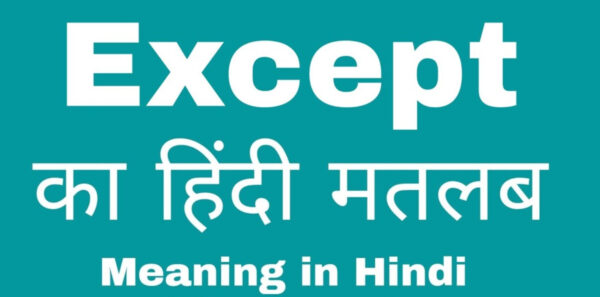
In Hindi, there is a word called “except” which has many different meanings. This article will help you understand what Except Meaning in Hindi “के अलावा” (ke alawa) and how it is used in different situations. By the end of this article, you will know everything about the word “except” in Hindi.
Understanding the word “Except” Meaning in Hindi knowing “के अलावा” (ke alawa) when something is not included. It is like when you have a group of things, but one thing is different and not part of the group. So, when we use “Except” in Hindi “के अलावा” (ke alawa), it helps us to say that something is not included in a particular group or situation.
In Hindi, the word “except” can mean different things depending on the situation. It is important to understand the context and what someone wants to say when using this word. Let’s look at some examples to understand it better.
Also Read: X*X*X Is Equal To 2
Literal translation of “except”
In Hindi, when we say “except,” we use the words “के अलावा” (ke alawa). This means that we are talking about something that is not included or left out. But “except” also has other meanings and uses that are more than just this simple translation.
“Except” as an exclusive term
In Hindi, when we say “except” it means that something or someone is not included in a certain group. For example, if we say “All students, except Ravi, passed the exam,” it means that Ravi did not pass but all the other students did.
“Except” in exceptional scenarios
Except is commonly used to express exceptions or exceptions in different scenarios. It helps in identifying that a particular situation, person or thing does not fit the general statement or rule. For example, when discussing dietary restrictions, one might say: “I eat all fruits except bananas.”
When we compare things and say that one thing is different from another thing, we use the word “except.” It helps us to show that something is not the same as everything else.
In Hindi, “except” is a word used to show that something is different or not the same as everything else. It can be used to compare things and say that one thing is different or special. For example, if we say “No one sings better than her, except for her sister,” it means that her sister is the only one who can sing as well as she can.
“Exception” as a conjunction
Sometimes when we use the word “except,” it means that something is different or not included. It’s like saying “but” or “besides.” For example, if someone says “I like all types of music except heavy metal,” it means they like every kind of music except for heavy metal.
“Exception” in a mathematical context
In math, when we say “except,” it means we are taking away something or not including it. It’s like saying we don’t want to use a certain number or variable. For example, if we have an equation x^2 + 5x = 0, we want to solve it but we don’t want to use the number 0.
The word “except” is usually used as a verb when we want to show that something or someone is not included in a group or a situation. It means that the thing or person is different or separate from the others.
In Hindi, when we want to say that we didn’t do or include something, we use a special word called “chhodna.” It means to leave or exclude something or someone. For example, if I say “I listened to all the songs, except that one,” it means I heard all the songs except for that particular one.
“Except” as a preposition
As a preposition, “except” can be translated in Hindi as “को छोड़कर” (ko chhodkar) or “को छोड़े” (ko chhode). It means omitting or excluding a specific person, thing, or condition. for
